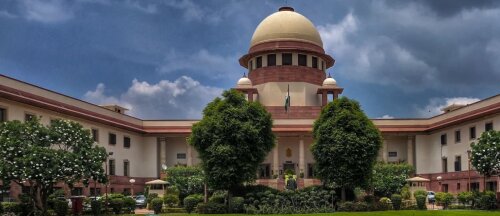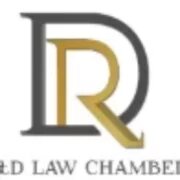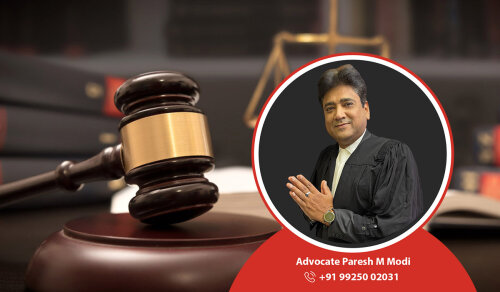Best Creditor Lawyers in Ahmedabad
Share your needs with us, get contacted by law firms.
Free. Takes 2 min.
List of the best lawyers in Ahmedabad, India
About Creditor Law in Ahmedabad, India:
Creditor law in Ahmedabad, India pertains to the legal rights and obligations of creditors in dealing with debtors who owe them money. This can include situations where individuals or businesses are owed money and need to take legal action to recover it.
Why You May Need a Lawyer:
You may need a lawyer in Creditor cases if you are facing issues such as unpaid debts, bankruptcy proceedings, or disputes with debtors over repayment terms. A lawyer can help you navigate the legal system, ensure your rights are protected, and represent your interests in court if necessary.
Local Laws Overview:
In Ahmedabad, India, creditor laws are governed by various statutes such as the Indian Contract Act, 1872, the Securitisation and Reconstruction of Financial Assets and Enforcement of Security Interest Act, 2002, and the Insolvency and Bankruptcy Code, 2016. These laws outline the rights and obligations of creditors, the procedures for debt recovery, and the consequences for non-payment of debts.
Frequently Asked Questions:
1. What is the process for recovering a debt from a debtor?
The process for recovering a debt involves sending a legal notice to the debtor, initiating legal proceedings in court, and obtaining a judgment for the amount owed.
2. Can a creditor take legal action against a debtor who refuses to repay a debt?
Yes, a creditor can take legal action against a debtor who refuses to repay a debt, including initiating a lawsuit for debt recovery.
3. What are the rights of creditors under the Indian law?
Creditors have the right to recover the debts owed to them, seize collateral if applicable, and initiate legal action against debtors who fail to repay their debts.
4. What are the consequences of not repaying a debt in India?
The consequences of not repaying a debt in India can include legal action, seizure of assets, and damage to one's credit score.
5. Can a creditor negotiate with a debtor to settle a debt outside of court?
Yes, a creditor can negotiate with a debtor to settle a debt outside of court through methods such as debt restructuring or repayment plans.
6. What is the role of a lawyer in creditor cases?
A lawyer can help creditors navigate the legal process, protect their rights, and represent them in court to recover debts owed to them.
7. How long does it typically take to recover a debt through legal action?
The time it takes to recover a debt through legal action can vary depending on the complexity of the case and the court's schedule, but it can take several months to years.
8. Can a creditor enforce a foreign judgment in India?
Yes, a creditor can enforce a foreign judgment in India under certain conditions outlined in the Code of Civil Procedure, 1908.
9. What are the options available to creditors if a debtor declares bankruptcy?
If a debtor declares bankruptcy, creditors can file a claim in the bankruptcy proceedings to recover a portion of the debts owed to them.
10. How can a creditor protect their rights when dealing with debtors?
Creditors can protect their rights by having proper documentation of the debt, sending legal notices to debtors, and seeking legal advice from a lawyer when necessary.
Additional Resources:
If you need legal advice or assistance with creditor issues in Ahmedabad, India, you can contact the Ahmedabad Bar Association or the Gujarat State Legal Services Authority for guidance and support.
Next Steps:
If you require legal assistance in creditor cases in Ahmedabad, India, it is advisable to consult with a qualified lawyer who specializes in debt recovery and creditor rights. They can assess your situation, advise you on the best course of action, and represent your interests in any legal proceedings.
Lawzana helps you find the best lawyers and law firms in Ahmedabad through a curated and pre-screened list of qualified legal professionals. Our platform offers rankings and detailed profiles of attorneys and law firms, allowing you to compare based on practice areas, including Creditor, experience, and client feedback.
Each profile includes a description of the firm's areas of practice, client reviews, team members and partners, year of establishment, spoken languages, office locations, contact information, social media presence, and any published articles or resources. Most firms on our platform speak English and are experienced in both local and international legal matters.
Get a quote from top-rated law firms in Ahmedabad, India — quickly, securely, and without unnecessary hassle.
Disclaimer:
The information provided on this page is for general informational purposes only and does not constitute legal advice. While we strive to ensure the accuracy and relevance of the content, legal information may change over time, and interpretations of the law can vary. You should always consult with a qualified legal professional for advice specific to your situation.
We disclaim all liability for actions taken or not taken based on the content of this page. If you believe any information is incorrect or outdated, please contact us, and we will review and update it where appropriate.














